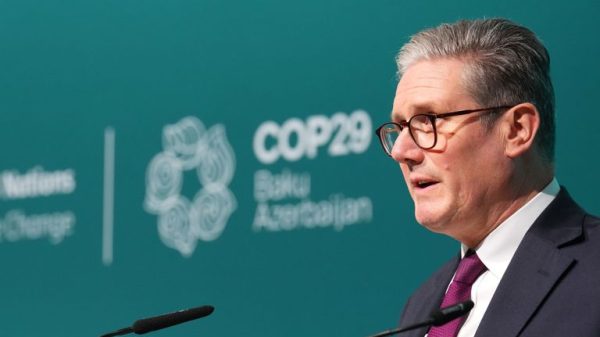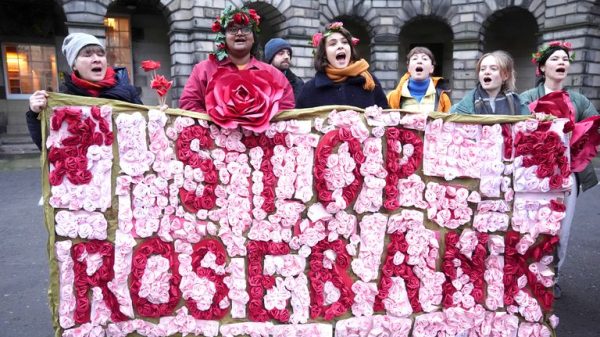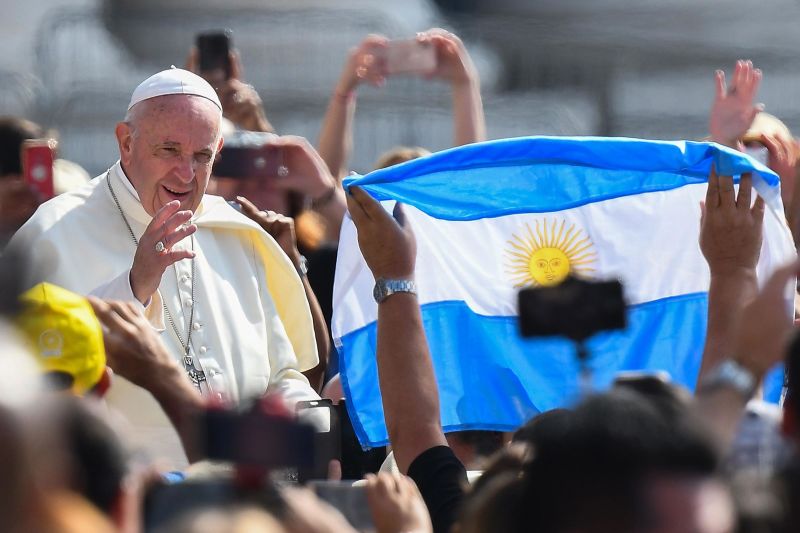On March 13, 2013, Oscar Crespo was watching TV in his native Buenos Aires when he saw the white smoke appearing above the Sistine Chapel at the Vatican: a new pope was elected.
As with millions of Catholics in Latin America, he was curious to know who would succeed Pope Benedict XVI. To his surprise he heard the name Bergoglio – the surname of his childhood friend – and was immediately overwhelmed by emotion, he recalled.
His election took Crespo and all of Argentina by surprise, while the rest of the world wondered who Jorge Bergoglio was.
In the following months, the local government even organized a special tour, “the papal circuit,” so tourists and pilgrims could get a glimpse of Bergoglio’s early years in his native Buenos Aires.
Soccer with friends
Jorge Bergoglio was born in Argentina’s capital, Buenos Aires, on December 17, 1936. The son of Italian immigrants, Mario and Regina, he was the eldest of five siblings.
He spent his childhood and teenage years at his family’s house in the heart of the middle-class neighborhood of Flores. A plaque outside his former home, 531 Membrillar Street, now proudly announces: “Pope Francis lived here.”
Like many South American kids, Bergoglio played soccer with friends around his neighborhood. A plaque on the ground at the Herminia Brumana square in Flores says: “In this plaza neighborhood children used to gather. Here, Jorge M. Bergoglio chased the ball with his friends. Afternoons of games and friendship.”
Young Bergoglio became a big soccer fan, supporting the Argentine team San Lorenzo. His love of the sport and of his team never diminished as pope, with Francis often seen holding San Lorenzo’s jersey, and hosting soccer teams at the Vatican.
“He loved music, dancing, and football. We went to watch so many football games,” Crespo said. He and Bergoglio became friends when they were 13 years old, a bond that endured when the latter became Pope Francis, even though he was never to return to his homeland.
Bergoglio grew up learning about literature and chemistry, among other subjects, and enjoyed everything typical of a teenage boy, Crespo says.
When he was 12, the Argentine even had a girlfriend who, decades later, was chased by the press after his election to the papacy.
Amalia Damonte told reporters in 2013 that the new pope had sent her a letter when they were both children. “He said to me, ‘If I don’t marry you, I’ll become a priest,” she recalled.
Years passed and Bergoglio indeed opted for priesthood. His deep spirit of service made him choose the Church, according to Crespo. Bergoglio entered the Jesuit religious order as a novice in 1958, was ordained in 1969 and became the sole archbishop of his native Buenos Aires in 1998.
He was made a cardinal in 2001 and served as president of the Argentine bishops’ conference from 2005 until 2011.
Bergoglio the priest and archbishop
As a Jesuit living under a vow of poverty, Bergoglio led a humble and austere life, forgoing even the slightest of luxuries. His rejection of the trappings of status once he became archbishop gave the world a hint of how his papacy would unfold years later.
He declined to live in the archbishop’s palace, choosing instead to live in a simple apartment. He also refused to use a chauffeured limousine, preferring to take the bus with ordinary people, and cooked his own meals.
“He never had a car, that was the reality. I used to travel with him on public transport. And when I bought a car, I used to give him a ride,” Crespo said.
The journeys with Archbishop Bergoglio included visits to the “villas” – shanty towns outside the capital – where he became a familiar face.
“He went to the villas to see who he could help. He (had) told me clearly: Look, I am going to be a priest because my aim is to be at the service of the people. For that, I’m going to the villas, I am going to go to the heart of the country,” Crespo recalled.
The austerity and simplicity of his life, along with a deep need to be close to the poor and marginalized, defined him as a priest and as a future pope, explained Argentine journalist Elisabetta Piqué, author of “Pope Francis: Life and Revolution.”
Piqué met Bergoglio for the first time in 2001 for an interview in Rome, an encounter which sparked a friendship that lasted for decades. At that time, she described him as a shy man who surprised her.
“He was really an open-minded priest with whom you could talk about everything,” Piqué said.
A day after Cardinal Bergoglio became Pope Francis, on March 14, 2013, he called Piqué and asked her about the reaction in his native Argentina.
The new pope mentioned he had been to pray at the Basilica of Santa Maria Maggiore in Rome, where he would years later request to be buried, and then went in person to pay his lodging bill at the Paulus VI hotel at which he stayed during the conclave – a gesture that surprised everyone.
Later that month, Francis’s decision not to live in the papal apartment on the top floor of the Apostolic Palace but in the Casa Santa Marta, the Vatican City residence where cardinals stay during the conclave, was unexpected and considered a revolutionary act by the new pope, Piqué explained.
As archbishop in Buenos Aires, Bergoglio would celebrate Mass in a prison or a hospital or hospice, trying to reach the marginalized and open the church up to everyone, a tradition that continued during his papacy and became part of his legacy.
“His legacy is about an inclusive church, a church that is for all, not only for a small group of perfect people. This is a pope who speaks to everyone and who speaks specially to the sinners … We have seen him going to prisons all over the world. We have seen him on Holy Thursdays going to prisons and washing the feet of the prisoners,” Piqué said.
Emilce Cuda, an Argentine theologist who worked closely with Francis as secretary of the Pontifical Commission for Latin America, described him as a strategist who used humor to navigate the Vatican as pope.
Crespo said that despite Bergoglio’s obvious talents, it had never occurred to his contemporaries that he would come to lead the Roman Catholic Church.
“I never imagined a classmate would become a pope. We would have thought that due to his intelligence he would become a minister, a position in public office, even president, but that he was going to be pope? It didn’t occur to any of us,” Crespo said.
He was a pope who never forgot his beginnings at the end of the world and always reached out to those on the peripheries, Piqué reflected. He stayed true to his friends too.
“One day in June 2013 the telephone rang, and a familiar voice said: ‘Hello Oscar, it is Jorge Mario,’ and I said, ‘The pope is calling me!’ Despite our friendship, I was still very surprised the pope called me,” Crespo said.



























